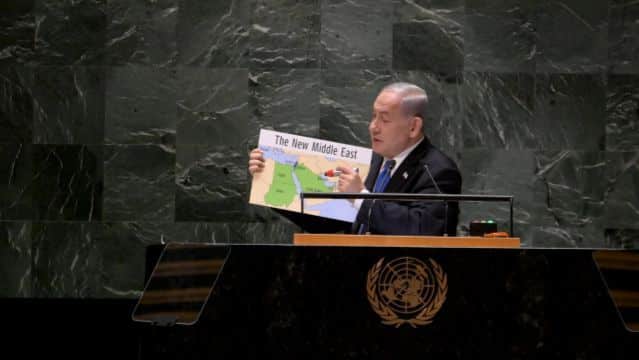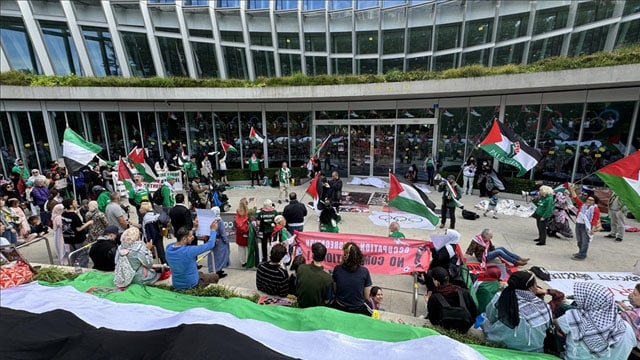European leaders have suddenly discovered their conscience regarding Palestine. French President Emmanuel Macron recently announced France’s intention to recognise an independent Palestinian state, while British Prime Minister Keir Starmer declared statehood “the inalienable right of the Palestinian people”. Yet beneath these apparently progressive proclamations lies a troubling reality. Both leaders advance a vision of Palestinian sovereignty so constrained by conditions that it resembles neocolonial control rather than genuine independence.
The timing reveals everything. After 21 months of watching Israeli forces kill over 58,000 Palestinians while engineering deliberate starvation in Gaza, Mr Macron and Mr Starmer now present themselves as champions of Palestinian rights. Their sudden conversion owes less to moral awakening than to domestic political pressure from increasingly vocal pro-Palestinian constituencies.
Macron’s conditional recognition
Mr Macron has shared a letter he has written to the Palestinian Authority’s President Mahmoud Abbas on his X handle. The French president’s letter to Mr Abbas, dated July 24th, appears generous in its promise to “fully recognise Palestine as a State” during September’s UN General Assembly. Yet the document reveals the French president’s deeply problematic conception of Palestinian sovereignty.
Consistent with its historic commitment to a just and lasting peace in the Middle East, I have decided that France will recognize the State of Palestine.
— Emmanuel Macron (@EmmanuelMacron) July 24, 2025
I will make this solemn announcement before the United Nations General Assembly this coming September.… pic.twitter.com/VTSVGVH41I
The letter confirms recognition only “in light of your commitments”, specifically Mr Abbas’s agreement to condemn the Operation Al-Aqsa Flood, which started on October 7th 2023, demand Hamas’s disarmament, and ensure “the future Palestinian State should not be militarised.” Mr Macron writes, “It is urgent to implement the only viable solution to fulfil the legitimate aspirations of the Palestinian people, end all forms of terrorism and violence, and enable Israel and all the region’s countries to live in peace and security.”
This formulation exposes the fundamental flaw in Mr Macron’s approach. He demands Palestinian disarmament while remaining silent about Israeli military capabilities. The logic proves perverse— the occupied must disarm to reassure their occupiers. Such reasoning transforms recognition into a tool for perpetuating rather than ending Palestinian subjugation.
The French president, heir to revolutionary traditions that championed national liberation, apparently believes sovereignty can exist without the basic right to self-defence. His vision of an independent Palestinian state strips away the core attributes of statehood—the monopoly on legitimate violence within defined territory—while preserving Israeli military dominance.
Neocolonial framework
Mr Macron’s letter reeks of the West’s entitlement to dictate terms to Global South nations. He decides unilaterally that an unarmed Palestinian state will guarantee regional peace, yet fails to explain why Israeli disarmament should not be equally necessary. This selective application of demilitarisation logic reveals underlying assumptions about which peoples deserve sovereign rights and which must accept permanent subordination.
Unsurprisingly, Mr Macron trusts weapons in the hands of the white men from Europe than the brown people of West Asia. It’s their shared concept of colonial “civilised vs uncivilised” narrative that drives the West’s thought process even today. So, a killer of thousands of Palestinians, including children, and an entity that has attacked multiple countries, is trustworthy than a people fighting for their national salvation—in a David vs Goliath scenario.
The demand for Palestinian disarmament becomes particularly absurd when considering the military balance. Palestinian resistance fighters possess rudimentary weapons—Kalashnikovs, rocket-propelled grenades, and crude homemade rockets—while Israel deploys one of the world’s most sophisticated military machines, backed by billions in American aid. Demanding equality of disarmament between such unequal forces constitutes political debauchery, yet Mr Macron goes further by demanding only Palestinian disarmament.
This framework perpetuates colonial logic under the guise of humanitarian rhetoric. European powers historically justified imperial control by claiming to bring peace and civilisation to supposedly violent natives. Mr Macron updates this formula for contemporary consumption: Palestinian independence can be recognised provided Palestinians accept permanent military inferiority to their former occupiers.
Starmer’s complementary duplicity
Mr Starmer reinforced these themes in his July 24th statement, which acknowledges “the suffering and starvation unfolding in Gaza is unspeakable and indefensible” while carefully apportioning blame. His call for Hamas to “unconditionally release all hostages” precedes any demand for Israeli policy changes, establishing a hierarchy of obligations that mirrors Mr Macron’s approach.
The suffering and starvation unfolding in Gaza is unspeakable and indefensible. pic.twitter.com/ca1vl5zM3j
— Keir Starmer (@Keir_Starmer) July 24, 2025
“We are clear that statehood is the inalienable right of the Palestinian people,” Starmer declares, before immediately qualifying this right with conditions. “A ceasefire will put us on a path to the recognition of a Palestinian state and a two-state solution which guarantees peace and security for Palestinians and Israelis.” The formulation suggests Palestinian statehood exists to serve Israeli security rather than Palestinian liberation.
The appalling scenes in Gaza are unrelenting.
— Keir Starmer (@Keir_Starmer) July 25, 2025
The UK will pull every lever we have to get food and lifesaving support to Palestinians, and we will evacuate children who need urgent medical assistance.
This humanitarian catastrophe must end. pic.twitter.com/eNg7E5ABme
For the West, Palestine can be independent and free only when it’s a subservient colonised entity of Israel, managed by a puppet controlled by Tel Aviv and living in perennial fear of Israeli occupation or massive aggression. What’s the guarantee for the Palestinian security is what neither Mr Macron nor Mr Starmer would discuss.
Mr Starmer’s statement proves particularly galling given Britain’s historical responsibility for creating the current crisis. The Balfour Declaration and subsequent Mandate policies established the foundations for Palestinian dispossession, yet Mr Starmer presents Britain as an honest broker rather than acknowledging this colonial legacy.
Timing of convenient morality
Both leaders’ sudden advocacy for Palestinian rights coincides suspiciously with domestic political pressures. Mr Macron faces growing pro-Palestinian sentiment across France, while Starmer confronts similar trends within Labour’s traditional constituency. Their letters represent calculated responses to political necessity rather than principled commitments to justice.
Meanwhile, even German Chancellor Friedrich Merz, who has taken upon himself to prolong the Ukraine war by providing long-distance weapons and ammunition to Volodymyr Zelenskyy’s government, has suddenly started playing a peace mascot regarding Palestine. Mr Merz joined his British and French counterparts to state as part of an “E3” coalition. He uses similar language, terms and conditions in his statement, underscoring European compulsions to act on the Palestine front, albeit to exploit the situation.
The time has come to end the war in Gaza.
— Bundeskanzler Friedrich Merz (@bundeskanzler) July 25, 2025
We – France, the United Kindom and Germany – urge all parties to bring an end to the conflict by reaching an immediate ceasefire: pic.twitter.com/hIfK2T710O
This opportunistic timing undermines the credibility of their proposals. European leaders remained mute spectators while Israeli forces systematically destroyed Gaza’s infrastructure, targeted civilians, and weaponised starvation against two million people. Their discovery of Palestinian rights after 21 months of genocide suggests political calculation rather than moral conviction.
The contrast with their silence during Israel’s most intensive bombing campaigns proves telling. Neither Mr Macron nor Mr Starmer, who came to office last year, found an urgent need to recognise Palestinian statehood when schools, hospitals, and refugee camps faced daily bombardment. Only when domestic political costs became apparent did Palestinian sovereignty suddenly require immediate attention, that too with imperial conditioning.
The no-state solution
The European leaders’ proposals ultimately constitute what critics accurately describe as a no-state solution disguised as Palestinian recognition. Their vision creates the appearance of sovereignty while preserving the substance of subordination. An independent Palestinian state without military capabilities, constrained by external security requirements, and subject to Israeli approval for basic governmental functions represents statehood in name only.
This framework serves Israeli interests perfectly by providing international legitimacy for continued domination while removing pressure for genuine decolonisation. Palestinians would receive symbolic recognition while Israel maintains practical control over their territory, resources, and security. Such arrangements historically characterise neocolonial relationships rather than genuine independence.
Since the Oslo Accords and Camp David meeting between the Palestine Liberation Organization (PLO) and the Israelis, the example set by the Palestinian Authority’s governance in Ramallah proves how ineffective the model of “two-states” would be if one follows the West’s prescription. Mr Abbas’s PLO (Fatah)-led government has been existing, without electoral validation, to play second fiddle to the Israeli forces. For months, Mr Abbas’s forces are helping the Israelis in the refugee camps within the West Bank.
The European approach also ignores fundamental questions about how disarmed Palestinian authorities could enforce law, protect citizens, or resist future Israeli incursions. Without military capabilities, Palestinian statehood becomes dependent on Israeli goodwill—a foundation too fragile for sustainable sovereignty.
Regional implications
Mr Macron and Mr Starmer’s conditions reflect broader Western anxieties about changing regional dynamics. Their insistence on Palestinian disarmament while ignoring Israeli military expansion reveals a determination to preserve existing power hierarchies despite rhetorical support for self-determination.
The European leaders’ selective application of sovereignty principles undermines international law’s credibility. If statehood requires external approval of internal security arrangements, then the Westphalian system collapses into hierarchical relationships between superior and subordinate nations. Such precedents threaten independence movements globally while legitimising imperial interference in domestic affairs.
Resistance question
Both Macron and Starmer demand Hamas’s elimination while offering no viable alternative for Palestinian self-defence. Their letters assume resistance organisations exist independently of underlying conditions rather than emerging from occupation and dispossession. This analysis absolves occupying forces while criminalising natural responses to foreign domination.
The European leaders’ approach ignores historical precedents where liberation movements evolved into state institutions following independence. By demanding the elimination of some resistance groups before statehood recognition, they remove Palestinian leverage while preserving Israeli advantages. Such sequencing ensures permanent Palestinian weakness rather than genuine conflict resolution.
Beyond European paternalism
The fundamental problem with Mr Macron and Mr Starmer’s approach lies in its paternalistic assumptions about Palestinian capabilities and rights. Both leaders present themselves as benevolent arbiters determining appropriate forms of Palestinian sovereignty rather than supporting unconditional self-determination.
Genuine support for Palestinian independence would recognise the right to self-defence, resist external dictation of internal arrangements, and acknowledge historical responsibility for current conditions. Instead, European leaders offer managed recognition that preserves existing power relationships while claiming progressive credentials.
The alternative requires abandoning neocolonial frameworks that subordinate Palestinian rights to Israeli security concerns. Independent Palestinian statehood means accepting Palestinian decisions about governance, defence, and development without external veto powers. Such recognition challenges European comfort zones while advancing genuine decolonisation.
Palestinian liberation ultimately depends on rejecting the false choice between continued occupation and constrained sovereignty. Mr Macron and Mr Starmer’s proposals represent sophisticated attempts to perpetuate domination through apparent recognition. Progressive observers should recognise these limitations while supporting authentic Palestinian self-determination beyond European paternalism’s narrow confines.
Join our channels on Telegram and WhatsApp to receive geopolitical updates, videos and more.







